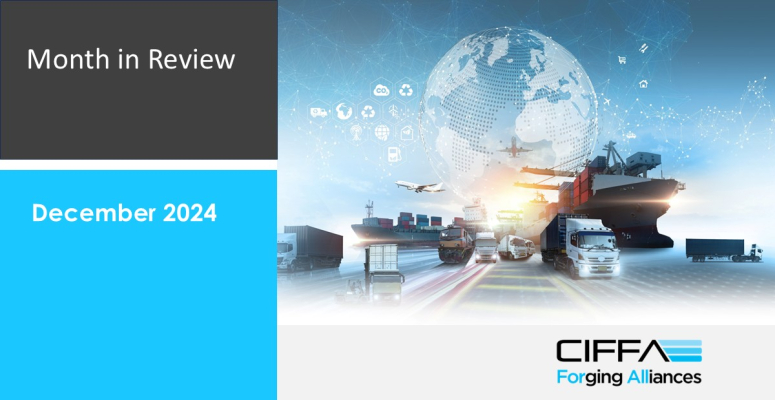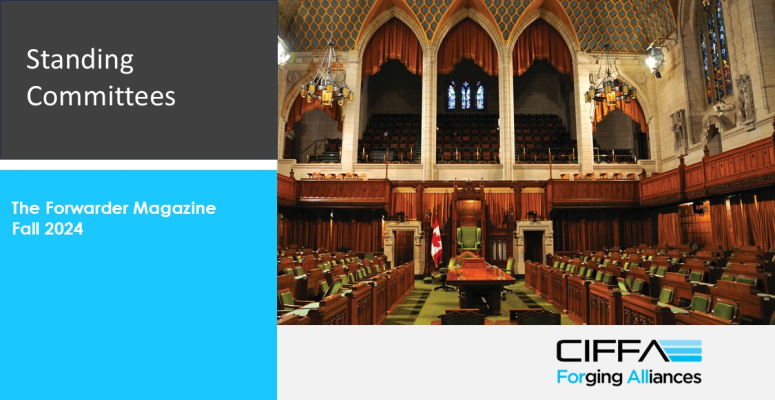
Month in Review – December 2024
Maritime
December 2: DP World Expands Port Saint John Capacity – Inside Logistics
DP World and Port Saint John have welcomed two of the largest cranes ever deployed at the port, marking a major step in enhancing container handling capacity and operational efficiency.
The new additions aim to bolster the port’s role in global trade and strengthen Saint John’s position as a key Atlantic gateway.
The cranes, each with an outreach of 65 metres and capable of spanning 24 containers wide, can service vessels exceeding 10,000 TEUs. Their arrival increases the port’s total to six quay cranes, the highest capacity in its history.
The arrival of the cranes coincides with the completion of the port’s $250-million modernization project.
December 3: ‘Gemini Cooperation’ Is Officially Open for Bookings, Kicking Off in February – Logistics Management
Effective December 3, the “Gemini Cooperation” ocean network is open for bookings, according to a customer advisory recently issued by Hapag-Lloyd. The Gemini Cooperation is a long-term operational collaboration between A.P. Moller-Maersk and Hapag-Lloyd, which will take effect in February.
Hapag-Lloyd will exit THE Alliance, which also includes Ocean Network Express, Yang Ming and HMM, at the end of January, and Maersk and MSC will conclude their 2M alliance at the same time, which they announced a year ago.
December 3: U.S. East Coast Longshore Contract Talks Break Down Over Automation – The Maritime Executive
After promising not to negotiate their new master contract in the media, the International Longshoremen’s Association and the United States Maritime Alliance issued statements arguing their positions on semi-automation technology for U.S. ports along the East and Gulf Coast. The ILA said the talks are at “a crossroads with ocean carriers and employers,” reporting an impasse over the use of semi-automated rail-mounted gantry cranes (RMGs).
After four scheduled days of negotiations, the ILA contends that USMX introduced new semi-automation mid-way through the talks, “causing the talks to break down.”
“USMX-ILA negotiations ended when management introduced their intent to implement semi-automation – a direct contradiction to their opening statement where they assured the ILA that neither full nor semi-automation would be on the table,” said ILA President Harold Daggett.
He said the stalemate over automation and semi-automation threatens to cause another strike in less than six weeks.
USMX responded saying it is not seeking to eliminate jobs but that U.S. East and Gulf Coast ports need to be made more efficient. They point out that most of the ports lack land to expand, saying that to meet demand and handle more volume the only way is “to densify terminals – enable the movement of more cargo through their existing footprint.”
December 9: Shippers Breathe Again as Threat of Indian Port Strike Eases – The Loadstar
Indian exporters and importers are breathing a sigh of relief as fears of a nationwide strike by unionized dockworkers across major government ports fade, according to industry sources.
Labour groups last month threatened to launch indefinite work stoppages from December 17 in a bid to force the government to implement terms of a wage contract hammered out two months ago at port management level.
Sources said officials at the Ministry of Shipping had finally received a mandatory “go-ahead” to approve revised contract conditions for signature. “A formal order is expected quickly, mostly by tomorrow,” said one source, privy to the information. “Officials have already been instructed.”
Union sources, however, said strike preparation plans would continue until the settlement that was agreed on in late September was implemented.
December 9: U.S. Halts Major Asian Shipping Alliance, Says Filing Lacked Details – Supply Chain 24/7
The U.S. Federal Maritime Commission (FMC) has delayed the start of the Premier Alliance Agreement, a proposed vessel-sharing partnership between HMM, Ocean Network Express (ONE) and Yang Ming. The agreement aims to allow the three companies to share vessels, charter space and collaborate on global shipping operations. It was designed to replace THE Alliance, which is being restructured following Hapag-Lloyd’s departure to join Maersk in the new Gemini Cooperation.
The Premier Alliance Agreement was filed with the FMC on October 28 and was set to take effect on December 12. However, the FMC determined that the filing lacked sufficient details to evaluate its competitive impact and compliance with statutory requirements.
The FMC has issued a Request for Additional Information (RFAI), requiring the companies to provide further documents and verified information to address unresolved issues. The review process will not resume until the FMC receives a fully compliant response. Once deemed complete, the Commission will have 45 days to analyze the agreement, and a 15-day public comment period will follow its publication in the Federal Register.
The delay has disrupted the alliance’s timeline, including the postponement of its planned Transpacific PS5 and PN4 services until May 2025. ONE has announced temporary adjustments to its existing services, adding calls at Ningbo and Qingdao on certain routes.
December 10: Ocean Carriers the ‘Outright Financial Winners’ in a Year of Unpredictability – The Loadstar
A year of unpredictability has led to substantial increases in both ocean and air freight rates, according to this week’s report from Transport Intelligence (Ti), and complicated market factors are making future trends hard to predict.
Ocean freight rates remain elevated – 117.6 points above January – and are not expected to return to pre-crisis levels any time soon, according to Ti data.
Indeed, chief analyst at Xeneta Peter Sand said the “clear outright financial winners” this year had been ocean carriers. “They went from a disastrous outlook, with loss-making freight rates, to a dream outlook, with subsequent massively high freight rates,” he explained.
December 12: Trump Backs ILA on Automation Concerns – Supply Chain Dive
President-elect Donald Trump voiced his support for the International Longshoremen’s Association’s stance against automation in a December 12 Truth Social post.
After meeting with ILA President Harold Daggett, Trump said the financial benefits of automation are “nowhere near the distress, hurt, and harm” the technology creates for workers.
In response to the president-elect’s statement, the United States Maritime Alliance, or USMX, claimed that automation is needed to support better pay for workers and help American consumers.
“To achieve this, we need modern technology that is proven to improve worker safety, boost port efficiency, increase port capacity, and strengthen our supply chains,” USMX said in a statement. “ILA members’ compensation increases with the more goods they move – the greater capacity our ports have and goods that are moved means more money in their pockets.”
December 16: Carriers Unveil Panama Canal Transit Surcharges for New Year – The Loadstar
Two major carriers have announced new Panama Canal surcharges on Asia-U.S. east coast transits in response to the canal authority implementing a new booking system to “optimize transit operations.”
As of January 1, the Panama Canal Authority (ACP) will modify its transit reservation system, including changes in the tariff structure and fee amounts and the introduction of new tariffs. ACP said the modifications aim “to improve the level of service, to reflect the value of the reservations service, to improve the supply and demand management and to optimize transit operations.”
MSC notified customers that, “to address the increased costs associated with these changes and maintain [its] commitment to providing reliable and efficient services,” it will introduce a Panama Canal surcharge on January 1.
And last week, CMA CGM similarly advised of a “Panama Canal transit surcharge” from January 1, “to recover this extra cost” and “keep providing most reliable services transiting through Panama Canal.”
December 18: Ocean and Premier Alliances Plan Jointly Operated Transatlantic Networks – The Loadstar
Following this week’s announcement from Japanese container line ONE that it is to participate in three transatlantic services with Ocean Alliance carriers, there has been further confirmation that next year will see the Ocean and Premier alliances jointly operating transatlantic networks.
According to analysts at liner database eeSea, the network rejigs represent a reform of the current transatlantic services operated as THE Alliance, which is set to be replaced by the Premier Alliance at the beginning of February.
Meanwhile, an advisory from CMA CGM said the French carrier would also be deploying tonnage on the service, meaning that at least two of the Ocean Alliance carriers would be operating tonnage on the ex-THE Alliance service from next year.
December 20: Qube Ports Faces More Strikes Across Australia – Splash
Strikes at major Australian ports are set to continue in an ongoing dispute between unionized workers and Qube Ports over contract negotiations. Work stoppages will take place in Adelaide, Brisbane, Darwin, Gladstone, Melbourne and Port Kembla.
Upcoming industrial actions will affect ports handling bulk goods, including grains, steel and machinery. Additionally, all participating port workers plan to stage eight-hour stoppages when vessels berth.
The dispute between the Maritime Union of Australia (MUA) and Qube Ports has been ongoing since contract negotiations broke down in April 2024.
“If the MUA prolongs or expands the scope of the strike, cargo handling delays will likely prompt supply chain disruptions through January,” maritime security consultancy Crisis24 warned.
December 21: Trump Demands Panama Lower Transit Fees or Return Canal – BNN Bloomberg
President-elect Donald Trump said on December 21 that the Panama Canal is charging “exorbitant prices and rates of passage” on U.S. naval and merchant ships, and he demanded that fees be lowered or else Panama should return the canal to the U.S.
“The fees being charged by Panama are ridiculous, especially knowing the extraordinary generosity that has been bestowed to Panama by the U.S.,” Trump said in a post on his Truth Social platform. “This complete ‘rip-off’ of our Country will immediately stop.”
The U.S. is the canal’s biggest customer, responsible for about three quarters of the cargo transiting through each year. A prolonged drought, however, has hampered the the canal’s ability to move ships between the Atlantic and Pacific oceans. U.S. National Economic Council Director Lael Brainard said last week that the resulting disruptions contributed to the supply chain pressures that have boosted inflation.
December 23: After Trump Threat, Mexican President Says Panama Canal Belongs to Panamanians – American Journal of Transportation
Mexican President Claudia Sheinbaum expressed support for Panama’s government on December 23 after U.S. President-elect Donald Trump threatened to reassert U.S. control over the Panama Canal.
“Indeed, the Panama Canal belongs to the Panamanians,” Sheinbaum said.
Sheinbaum’s comments came one day after Trump accused Panama of charging excessive rates to use the Central American passage. After the event, he posted an image on Truth Social of an American flag flying over a narrow body of water, with the comment: “Welcome to the United States Canal!”
Panamanian President Jose Raul Mulino swiftly denounced Trump’s comments.
December 26: Hapag-Lloyd Sets Work Disruption Surcharge for U.S. East/Gulf Coast Ports – The Maritime Executive
With the labour contract unresolved and fears increasing for another longshoremen’s strike at U.S. ports on the East and Gulf Coast, Hapag-Lloyd announced plans for surcharges for all containers booked to the ports. The strike could start in just three weeks and the fees would kick in days later should a strike occur.
“To help manage the potential impact of ongoing challenges at U.S. East Coast and Gulf ports, we are introducing a Work Disruption Surcharge (WDS) and Work Interruption Destination Surcharge (WID), effective January 20, 2025, in the event of a strike,” Hapag writes in a customer alert. “This surcharge covers additional costs from labour disruptions, strikes, slowdowns, unrest, congestion and other unforeseen events that may delay operations and incur extra handling, storage and feeder service costs.”
The fees would be from ports all around the world for cargo gated-in on or after January 20. The charge will be $850 for a 20-footer and $1,700 for a 40-footer.
Containers gated in prior to that date or already on the water will not incur the surcharge.
December 27: Panama’s President Rejects Trump’s Claim of Chinese Interference at Canal – American Shipper
Panamanian President José Raúl Mulino dismissed claims by President-elect Donald Trump of higher fees charged to U.S. ships to use the Panama Canal and scoffed at threats to take over the vital waterway because of Chinese interference.
“The tolls are not set at the whim of the presidents [of Panama] and the administrator of the [canal]. They are set in a public and open process in which clients and other actors participate,” Mulino said at a news conference.
He added, “There are no Chinese soldiers in the canal, for the love of God. It’s nonsense. There are no Chinese at the canal, no Chinese nor any other world power at the canal.”
Air
December 4: Limitations of Liability for International Air Transportation are Rising – Benesch
The limitation of liability for cargo that is lost or damaged during international air transportation will increase on December 28, 2024, from 22 Special Drawing Rights (SDRs) per kilogram to 26 SDRs per kilogram.
The change in international law is due to an increase under the Montreal Convention 1999, formerly known as the Convention for the Unification of Certain Rules for International Carriage by Air, which applies to traffic with signatory nations. The change was recently announced by the International Civil Aviation Organization (ICAO), a United Nations agency that leads international alignment of technical standards and strategies for international air shipments.
Rail
December 2: Union Says Negotiations with CPKC Have Reached an Impasse – Inside Logistics
Unifor said negotiations with CPKC have reached a stalemate and, as a result, Local 101R will hold strike votes across the country in the coming weeks.
December 9: CN Reaches Tentative Agreement with Union Representing Mechanics, Clerks – CBC News
Canadian National Railway has reached a tentative agreement with the union representing its mechanical workers and clerks, the company announced on December 9, just two weeks after workers voted to authorize a strike.
Details from the tentative four-year agreement with Unifor will not be released publicly until it is ratified, according to a CN news release. The current collective agreement is set to expire on December 31, 2024.
Two weeks ago, Unifor said two of its member groups voted overwhelmingly in favour of a strike mandate that would have seen workers walk off the job as soon as January 1, 2025.
One group comprises 2,100 mechanics, technicians, crane operators, machinists and electricians, and the other includes 1,500 administrators and customer support staff.
December 23: Unifor Ratifies CN Contracts – Progressive Railroading
Unifor members who work for CN have ratified new four-year collective agreements, the Class I and union announced.
The union represents 3,300 employees at CN in Canada, working in different mechanical, clerical and intermodal functions, all covered by multiple collective agreements.
The new agreements include 3% wage increases annually and expire December 31, 2028.
Trucking
December 9: Quebec Restricts Access to Driving Privileges for Newcomers to Improve Road Safety – Transport Routier (translated from French)
The Minister of Transport and Sustainable Mobility, Geneviève Guilbault, announces that the Quebec government intends to amend the Regulation respecting permits in order to better regulate access to the right to drive for people wishing to settle in Quebec.
In the future, foreign driving licence holders who fail their practical test will lose the right to drive alone and will be issued a learner’s licence.
“The meteoric rise in immigration to Quebec has had a significant impact on our services, but also on our roads. With high failure rates among newcomers, it was imperative to take action to tighten the rules for access to driving,” said Guilbault.
December 10: Ontario Driving School Enrolments, Fees Plummet as International Student Pipeline Runs Dry – Today’s Trucking
The race to the bottom in new truck driver training is well and truly underway in Ontario’s trucking heartland. Truck driving schools are witnessing a steep drop in enrolments and fees as competition to attract a dwindling number of students has grown increasingly fierce.
After the federal government announced curbs on international student numbers a couple of months ago, some truck driver training schools in Peel Region – comprising Mississauga, Brampton and Caledon – say enrolment has plummeted 40% to 60%. International students worried about their status in Canada are shying away from investing in a trucking career.
More alarming, many of the scores of schools in the area are reducing fees in a desperate bid to sign up the few aspiring truckers available.
Philip Fletcher, president of the Truck Training Schools Association of Ontario (TTSAO), said there are 107 truck driving schools in the Greater Toronto Area. “The over-proliferation of schools is creating a cutthroat mentality, where people are cutting costs in order to try to stay alive,” he said. “They are cutting corners, and they are cutting training time.”
He’s had his association members contact him saying they couldn’t continue to offer training in this environment. Fletcher observed that on average, one-on-one training in a truck costs $120 an hour. MELT mandates 32 hours of on-road training, meaning it would cost a school $3,840 per student. “How are they charging only $3,000 or $3,500?” he asked.
December 13: TQL Asks U.S. Supreme Court to Resolve Issue of Broker Negligence in Motor Carrier Crashes – Land Line
Despite winning its wrongful death case in a U.S. federal appellate court, broker Total Quality Logistics (TQL) is asking the Supreme Court to hear its case to resolve conflicting rulings at circuit courts that address whether a broker is liable for crashes involving motor carriers it has hired.
On December 10, TQL filed its brief with the Supreme Court in a case stemming from a fatal crash involving a motor carrier it hired. The victim’s wife, Kathy Gauthier, claimed the broker should be liable for negligent hiring.
Both the district court and the 11th Circuit Court of Appeals ruled that the Federal Aviation Administration Authorization Act (F4A) protects brokers from personal injury negligence claims. In November, Gauthier petitioned the Supreme Court to hear the case and overturn the ruling.
Typically, the party on the winning side of the appellate case will urge the Supreme Court to deny the petition to secure its win. However, this is not the first or second time the high court has been asked to weigh in on the topic, and TQL wants to put the issue to rest.
December 14: Rising Rejection Rates amid Demand Drop Reveal Truckload Capacity Exodus in U.S. – FreightWaves
Carriers in the U.S. are accepting the same load volumes that they were in April 2023, near the theoretical floor of the freight market’s recent recessionary period. Rejection rates (the rate at which carriers turn down load coverage requests from contracted shippers) are more than double what they were at the time. This is further evidence that a significant amount of supply has left and is continuing to leave the American domestic truckload market.
December 16: Fleets Have Rapidly Improved Fuel Efficiency Since 2022: NACFE – Today’s Trucking
The North American Council for Freight Efficiency’s (NACFE) Fleet Fuel Study reveals that fleet-wide fuel efficiency has significantly improved over the last two years, with average miles per gallon (MPG) rising to 7.62 in 2022 and 7.77 in 2023. These results mark year-over-year gains of 4.2% and 2.0%, following a period of little improvement from 2018 to 2021.
During a webinar discussing the study, Yunsu Park, NACFE’s director of engineering and the lead author, emphasized the role of technological and operational advancements. “The adoption rate for the Fleet Fuel Study fleets of all technologies is at an all-time high, and so are MPGs,” he explained, noting that broader market trends also contributed to the gains.
The study highlights that the adoption of fuel-saving technologies has reached 42%, up from just 17% in 2003. This increase has allowed the 14 participating fleets, which operate 75,000 trucks, to save $512 million in 2023 compared with the average truck on the road.
December 27: States Acting to Curb Nuclear Verdicts Across U.S. – Transport Topics
State lawmakers are taking wider aim at lawsuit abuse, working to curtail an issue that for years has vexed the trucking industry and which now is drawing more mainstream legislative attention due to the thousands of dollars per year it is estimated to cost average Americans.
Per the U.S. Chamber of Commerce, frivolous lawsuits are estimated to cost the average U.S. household more than $4,000 per year, as measured in tort costs incurred by each state.
The Chamber’s Institute for Legal Reform put costs and compensation in the U.S. tort system at $529 billion in 2022, equal to 2.1% of GDP and averaging $4,207 per household. The per-household costs per state vary and consist of total court costs paid in individual states, and the figures include general and commercial litigation liabilities (such as personal injury claims), automobile accident claims and medical liability claims. The findings come from the Chamber’s recently updated analysis, “The Hidden Costs of Lawsuits Continue to Grow.”
CIFFA Advocacy, Communications, Activities
December 17: CIFFA Contributes to Report by Standing Committee on International Trade
Canada’s Supply Chains and Expanded International Trade: Challenges and Measures, a report issued recently by the Standing Committee on International Trade, is the result of a study undertaken to: identify programs, tools and measures that support the growth of Canadian businesses and their contributions to domestic and global supply chains, export abroad, and becoming integral players in various economic sectors; and diversify and increase the presence of Canadian businesses in global markets, focusing on areas of competitive advantage and regional diversity of goods and services.
During eight meetings held between January 30 and May 9, 2024, the Committee heard from Government of Canada officials, 12 trade associations, seven Canadian firms, two Canadian port authorities, two federal Crown corporations, one Canadian airport authority, one not-for-profit organization, one think tank and one Canadian mayor. As well, the Committee received three written
responses – from the Canada Border Services Agency, the Economic Development Agency of Canada for the Regions of Quebec, and Global Affairs Canada – and three briefs – from the Canadian International Freight Forwarders Association, the Organization of Canadian Nuclear Industries and UPS Canada.
The report summarizes comments relating to supply chains and expanded international trade that witnesses made to the Committee during a meeting or in a written response or brief. The first and second sections focus on Canada’s supply chains, and the third and fourth sections are concentrated on expanding the country’s international trade. For each of these two areas, observations are provided about selected challenges, as well as about existing and proposed federal measures. The final section contains the Committee’s thoughts and recommendations.



